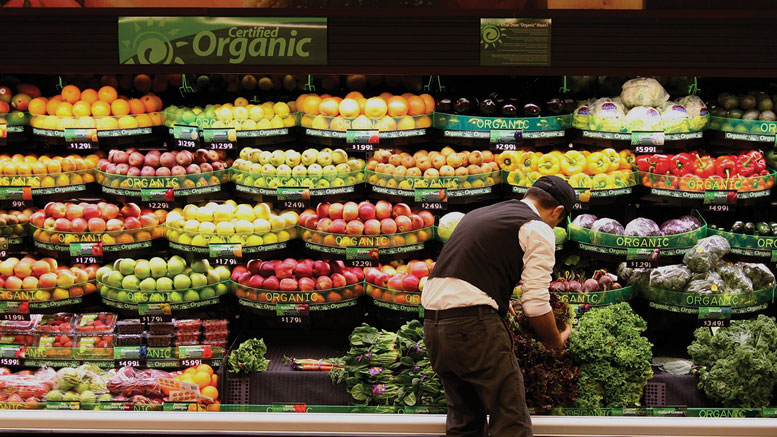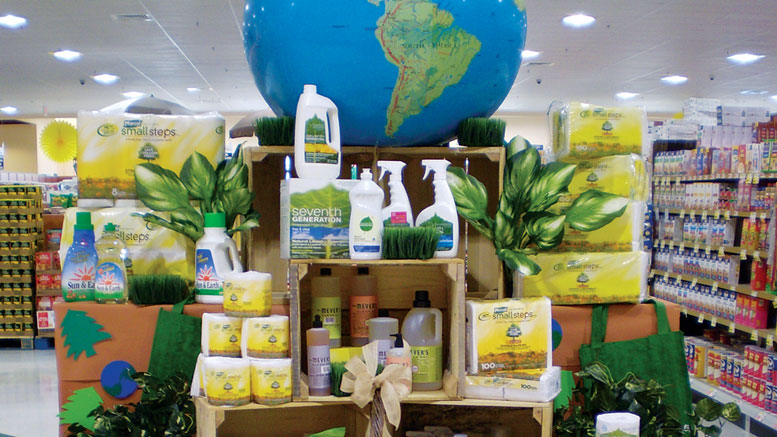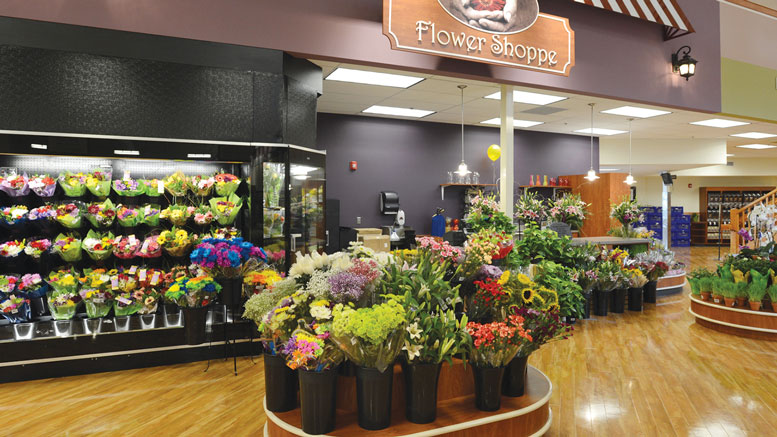Armed with Wakefern’s innovative sustainability platform, ShopRite members champion personal sustainability paths and team up to maximize winning strategies.
This year’s sixth annual retail sustainability award beckons a new and unique dimension. As the first cooperative to win the honor — this is not just any co-op — it’s the largest retailer owned co-op in the U.S. Capitalizing on inherent and rare dynamic structural attributes, corporate executives and independent members collectively breathe sustainability and jettison green across a wide and varied swath.

Wakefern Food Corporation, based in Keasbey, NJ, is ShopRite Supermarkets’ procurement and warehouse distribution arm. The company provides members with a host of services and resources, from common marketing and advertising programs to engineering systems, promising technologies, and food safety best practices, among others. The core pillar, though, is its cleverly collaborative sustainability platform and tactical implementation and measuring tools, such as its Retail Green Team Sustainability Tool Kit, which garnered a coveted Award of Publication Excellence [APEX] for Education.
Wakefern corporate executives modestly accepted the award, crediting the success to its members, and emphasized the importance of honoring the 50 multi-generational families, who independently own and operate some 250 ShopRite Supermarkets, as well as seven Fresh Grocers between them. Wakefern also has a group of 33 wholly owned ShopRite stores and 54 corporate-owned PriceRite stores.

The cooperative’s sustainability commitments strongly intersect with the produce department and its operations as well as procurement, critical touch points in the members’ individual accomplishments as well as their collective mission toward green, according to Derrick Jenkins, vice president produce and floral at Wakefern Food Corp. [See Q&A on page 30.]
ShopRite members/owners serve a wide spectrum of communities across the Northeast and neighboring regions, with stores in New Jersey, New York, Connecticut, Delaware, Maryland, and Pennsylvania.
Joining Forces
“Our structure is unique,” says Suzanne Forbes, Wakefern’s environmental affairs administrator. “Our members own Wakefern, which is different than many other cooperatives. All members share resources to help them compete with international firms,” she says.

“It’s a pretty tight family. We adopt policies as a group and do things through committees — Produce, Quality Assurance, Environmental, etc., which include both members and Wakefern staff. We identify initiatives, such as energy, waste and water use reduction we believe is worthwhile for our members to pursue, along with co-op goals, guidelines and tools to move forward,” she says, keen to point out, “Our members are all eager to become more sustainable organizations and at the same time get costs out of the system.”
The Sustainability Committee focuses on members, who help identify new opportunities, such as a Fair Trade initiative, sustainable packaging, or retail tool kit for measuring impacts. “We meet quarterly, and then subcommittees take action. In the past couple of years, we’ve experienced an influx of companies coming in with claims of products being eco-friendly or green,” says Forbes.
Realizing the need to discern these claims, Wakefern formed a new Category Management Training Committee to glean and disseminate basic knowledge on these products, as well as discover better ways to merchandise and promote them.

“We always believe we should begin the sustainability journey here at home before requiring such edicts from our suppliers,” says Forbes. At the same time, “We are looking to work with more sustainable companies and brands,” she says. “We will be partnering with suppliers on a fairly new initiative to start our own private label sustainable packaging.”
Wakefern runs a company-wide recycling program, where members collect all types of materials, including cardboard, wooden pallets, plastic bags, floral buckets, and food packaging across departments to funnel back to Wakefern, which manages the process.

“We’ve also helped members set up food waste recovery programs, connect with vendors and assist in negotiating contracts for more favorable rates,” says Forbes.
While Wakefern and its members are invariably bonded, members remain self-determining. “Members are independent, and we don’t mandate sustainability measures,” emphasizes Forbes. Still, they want to be on board, evidenced by the fact that members not only reach goals but also often far exceed them, according to Karen Meleta, vice president of consumer and corporate communications at Wakefern.

Store owners accumulated prestigious government and industry-based sustain-ability awards, she explains. These include Outstanding Achievement in Food Waste Prevention and Diversion from the Environmental Protection Agency (EPA), multiple EPA Gold Green Chill Award Certifications, in addition to state and local recognitions for establishing smart, sustainable workplace and community programs.
Dual Strategies And Definitions
In certain instances, separate corporate sustainability programs complement those of its individual members and vice versa. For example, Wakefern Food Corp. undertakes a far-reaching and impactful campaign to fight hunger.

“At the corporate level, we’ve had a dedicated partnership for many years with the main food bank here,” says Jenkins of the produce department’s strong commitment to food waste recovery and diversion. “This is a larger program, but members also have their own relationships with food banks in their communities,” he says, adding, “We don’t do composting here, but various members do.”
While Wakefern has its own direct relationships for local procurement, there are limitations. “Since Wakefern has responsibility for the overwhelming procurement of products, some farming operations are too small for us, but may have a relationship with an independent ShopRite member,” says Jenkins. It could be a local corn grower, a small orchard or a farm that doesn’t have enough product to accommodate the total chain, he says, emphasizing that food safety best practices and training are a critical underpinning of all programs.

“There are quite a few of these local operations, and we find more and more small family farms growing specialty mushrooms or peppers. Customers really appreciate when their neighborhood store brings these in,” says Forbes. “We would not necessarily define local solely from a sustainability point of view, but to that degree, it reduces travel, supports local businesses, and helps to build and sustain the community. Still, there’s lots more to it in terms of land management and other variables, says Forbes.

“We do Fair Trade flowers, and from the perspective of paying people fair wages and improving lives, this is truly a sustainability initiative, she explains, pointing out, “The organic produce area continues to grow, but we’re not necessarily saying organic equals sustainability. That’s a consumer perception.”
A Perfect Union
“Our advantage as a co-op of 50 separate operators is our power in product and services to compete with much larger chains, while maintaining autonomy for our associates and customers,” says Joseph Colalillo, chairman and chief executive of Wakefern Food Corp. since 2005 and member of its board of directors since 1988. He also is president of ShopRite of Hunterdon County, with three stores in New Jersey, and two more to open this year in Pennsylvania. “As members, we have certain rules and regulations we follow, but we remain local and independent,” he says.

“Joe Colalillo is definitely a champion of ours with sustainability and a very supportive ally,” says Forbes. “He was one of the first to do composting, grabbing the bull by the horns. As a store owner, he hears from his customers on a daily basis and knows what’s important to them.”
A long-tenured ShopRite member and sustainability advocate, Colalillo brings an informed perspective to the table. “As Wakefern chairman, I try to keep us focused, working hand in hand with corporate, members and customers. Our whole co-op is based on relationships. It’s all about making every member successful. It’s the fabric of who we are.”
Growing sustainably is a part of that. “Our sustainability program enables all of us, from the associate bagging groceries or cutting vegetables to the store manager, to have a purpose. I can do something bigger that my company believes in and make a difference,” he says. “We have a great foundation of associates that really believe in volunteerism. They want to make their stores and communities better.”

Green Teams
Green Teams are part of a company-wide collaborate strategy at both the retail and corporate levels, drawing in volunteers from all departments and job positions to seek out opportunities to bring to corporate, and generate thoughtful sustainability solutions.
“Green Teams (started at Wakefern within the past five years) are a cornerstone of Wakefern/ShopRite sustainability,” says Colalillo. They represent a philosophy. It’s no different than customers giving feed-back,” he says. “We can talk about recycling cardboard bales and larger programs that will be top-driven, but Green Teams are about those people throughout the company getting the ideas, and about how to capitalize on those ideas.”
Green Teams are a mechanism to encourage participation and empower employees, he continues, noting that Green Team members are all volunteers. The Environmental Affairs Department has tools for them to use.


(L-R) Melissa Kenny of Delaware Supermarkets and Suzanne Forbes of Wakefern speak at the Food Recovery Challenge Benefit. Wakefern offers a sustanability toolkit for its 250 plus stores to support the EPA Food Recovery Challenge and additional ways to reduce food waste.
Colalillo has hundreds of people working for him, and Green Teams provide a way for them to have a voice. “These associates work hard; it’s a labor- intensive business and not easy,” he says. “Green Teams are not just contributing to the welfare of the company and customers but also to the community and the Earth.”
A Sustainable Outcome, Naturally
This cooperative structure has been a critical asset in propelling its members’ sustainability efforts by creating an ideal balance. On one hand, members enjoy advantages that avail an independent family retailer — risk-taking agility and flexibility to change course on a dime. They also benefit from close ties with their communities and grassroots-savvy ability to adapt to their changing marketplace and tailor programs to the local customer base. Yet members can capitalize on the corporate advantages of joining forces, whether gaining efficiencies with buying power and economies of scale or participating in Wakefern’s Biennial Sustainability Summit. It is here, according to Meleta, where members present their findings on various sustainability projects, meet vendors, attend workshops with experts and swap brainpower on what worked and in some cases what didn’t.

It led members to highly successful food waste recovery, composting and recycling programs, drastic reductions in energy use by revamping store refrigeration and lighting systems, while experimenting with hopeful technologies, such as solar and electric car charging stations. From Fair Trade to locally-grown to food bank partnerships and community outreach, sustainability envelops the cooperative with the produce department being an integral component.

Honoring Members
With members at varying stages in their sustainability journeys, PRODUCE BUSINESS elicited the help of Wakefern executives to select several storeowners to profile.
“These are members in the forefront of sustainability, taking the lead in piloting programs or doing something exceptional,” says Meleta.
On the following pages, PRODUCE BUSINESS set out to tell their personal stories of investing in sustainable alternatives based on needs and circumstances within their stores and communities; as well as the role Wake-fern plays in bringing their goals to fruition.





